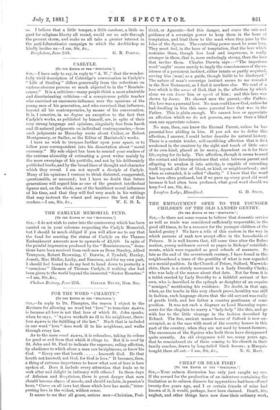FOR THE WORD " CHARITY."
[To THE EDITOR OF THE ..SPECTATOR.1 SIR,—B.1 reply to Dr. Plumptre, the reason I object to the Revisers for allowing no word but "love" to translate c4yciTrn, is because all love is not that love of which St. John speaks, when he says, " 'Ayci.r); worketh no ill to his neighbour, there- fore ti-itig-s is the fulfilling of the law." Much that is included an our word " love " does work ill to his neighbour, and walks through every law.
As to the mere word dwizs, it is colourless, taking its colour for good or evil from that which it clings to. But it is used by 'St. John and St. Paul to indicate the supreme, ruling affection, 'by obedience to which alone a man can be righteous, or know his .God. " Every one that loveth knoweth God. He that loveth not knoweth not God, for God is love." It becomes, then, a thing of extreme importance to know what sort of love is here -spoken of. Does it include every attraction that leads us to seek after and delight in intimacy with others ? In these days of Atheism and Scepticism, there is great danger that men should become slave of moods, and should exclaim, in passion's hour," Curse on all laws but those which love has made," inter- preting love in the widest, wildest sense.
It seems to me that all grave, serious men—Christian, Posi-
tivist, or Agnostic—feel this danger, and crave the rule and guidance of a sovereign power to keep them in the hour of temptation, and bind them to the mast when they pass by the Isles of the Syrens. The controlling power must be some love. They must feel, in the hour of temptation, that the love which restrains them, though less loud and impetuous, is really stronger in them, that is, more enduringly strong, than the love that invites them. Charles Darwin says :—" The imperious word 'ought' seems merely to imply the consciousness of the ex- istence of a persistent instinct, either innate or partly acquired, serving him [man] as a guide, though liable to be disobeyed." The nature of man's sovereign instinct seems to me revealed in the New Testament, as I find it nowhere else. We read of a love which is the name of God, that is, the affection by which alone we can know him or speak of him ; and this love was shown by Jesus. He showed men the parent,—the Father. His love was a parental love. No man could know God, unless he had dwelling in him this same parental love that was in the Father. This is plain enough. We cannot love or appreciate an affection which we do not possess, any more than a blind man can appreciate colours.
No man, then, can know the Eternal Parent, unless he has parental love abiding in him. If you ask me to define this affection, I answer, I could better describe its natural history. There is a certain tender, self-sacrificing affection that is first awakened in the creature by the sight and touch of little ones of its own kind, placed at its mercy, dependent on it for their life, crying for its help. This affection, though it seems to need the contact and interdependence that exist between parent and offspring to awaken it into activity, is capable of extending itself beyond all ties of blood, or kind, or neighbourhood ; and when so extended, it is called " charity." I know that the word has been often profaned, but if we gave up every good old word because it had often been profaned, what good word should we keep P-1 am, Sir, &c.,


































 Previous page
Previous page